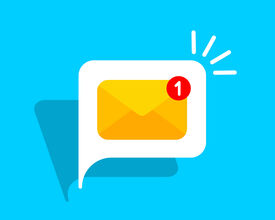Effective communication is paramount in the dynamic world of event planning, where every detail counts. While social media and other digital channels have their place, email marketing remains the cornerstone of successful event promotion.
With a staggering ROI of $36 for every $1 spent, email marketing is clearly a crucial tool for event success.
But how can event planners leverage email marketing to its full potential? This guide will walk you through creating a compelling email marketing campaign, from strategy to execution, ensuring your events are not just well-attended but truly memorable.
What is email marketing? And why is email marketing essential for event success?
Email marketing is a strategic communication tool that sends targeted messages to a specific group of recipients or individuals via email. In the context of event planning, it serves as a direct channel to reach your audience, whether you're promoting an upcoming event, confirming registrations, or engaging with attendees after the event.
At its core, email marketing is about building relationships. Unlike social media, where your message competes with countless others, email offers a more personal touch. It allows you to speak directly to your audience, tailoring your content to their needs and interests through personalisation. This makes it an incredibly effective way to nurture leads, drive ticket sales, and keep your community informed.
Email marketing is also highly measurable. Tools that track open rates, click-through rates, and conversions can give you valuable insights into your audience's behaviour. This data helps you refine your strategies, ensuring that each email you send is more effective than the last.
For event planners, email marketing is indispensable. It's not just about sending reminders or updates; it’s about creating a journey for your attendees - from the initial invitation to post-event follow-ups - ensuring they feel engaged and valued at every step.
Crafting your event email marketing strategy
A successful email marketing campaign begins with a clear strategy. Define your goals - driving registrations, increasing engagement, or building brand loyalty - and tailor your emails to meet these objectives. Here's a step-by-step approach to building an effective strategy:
1. Segment your audience
Segmentation is crucial for delivering relevant content to your audience. Divide your email list into segments based on past event attendance, interests, and engagement levels. For example, send different messages to first-time attendees and returning guests. This ensures your emails resonate with each recipient, increasing the likelihood of engagement.
2. Create a content calendar
Timing is everything in email marketing. Develop a content calendar that outlines when each email will be sent. Start with an initial announcement to generate excitement, followed by regular updates, reminders, and post-event follow-ups. Schedule emails around key dates like early bird deadlines or event milestones for maximum impact.
However, it's important to note that not all emails should be sent out on the same day. Instead, you can create tailored email journeys based on specific user actions. For instance, you might schedule follow-up emails to be sent one day, one week, and two weeks after someone registers for your event. This ensures that every participant receives the same valuable information but at different times, depending on when they register. This approach personalises the experience and keeps your communication relevant and timely.
3. Personalize your emails
Personalization goes beyond just using the recipient's name. Tailor your content to address their specific needs and interests. For instance, if your event features multiple tracks or sessions, highlight the ones most relevant to each segment. This increases engagement and helps build a stronger connection with your audience.
4. Craft compelling subject lines
Your subject line is the first thing recipients see, often determining whether your email gets opened. Make it catchy, concise, and relevant to the content. Use action-oriented language and create a sense of urgency to encourage immediate opens. For example, "Don't Miss Out: Last Chance to Register for Our Exclusive Event" can drive more engagement than a generic subject line.
5. Use a personal email address and name for better engagement
When sending event-related emails, consider using a personal email address and name rather than a generic one like 'info@yourevent.com'. Emails from a recognisable individual, such as the event organiser or a key team member, tend to feel more personal and trustworthy. This approach can significantly boost open rates and engagement.
For example, instead of sending an email from 'events@yourevent.com', use a name like 'Sarah from Your Event Team' with an email address like 'sarah@yourevent.com'. This simple change makes your emails more like a direct conversation, encouraging recipients to read and respond. It also helps build a stronger connection between your brand and your audience, fostering a sense of familiarity and trust.
Types of event emails you should send
Understanding the types of emails you should send is key to a successful campaign. Here's a breakdown of essential emails for your event:
1. Event announcement
Kick off your campaign with a strong announcement email. This should include all the essential details - date, time, venue, and a compelling reason to attend. Make sure to include a clear call to action (CTA) that directs recipients to your registration page.
2. Registration confirmation
Once attendees sign up, send a confirmation email acknowledging their registration and providing them with key information about the event. This email should include the event schedule, venue details, and materials they might need to prepare.
3. Reminder emails
As the event date approaches, send reminder emails to keep your event top of mind. These can be sent at intervals such as two weeks before, one week before, and the day before the event. Include last-minute details, like parking information or app downloads, to ensure attendees are fully prepared.
4. Post-event follow-up
After the event, send a follow-up email thanking attendees for their participation. This is also a great opportunity to include a feedback survey, offer exclusive discounts for future events, or share content like presentation slides or event recordings.
Best practices for event email marketing
To maximize the effectiveness of your event email marketing, keep these best practices in mind:
- Optimize for mobile: Ensure your emails are mobile-friendly, as a significant portion of your audience will read them on their phones. Use responsive design to make sure your emails look great on any device.
- Test and optimize: A/B testing is crucial for refining your emails. Test different subject lines, send times, and content formats to see what resonates best with your audience. Use the data to optimize future campaigns.
- Use engaging visuals: Incorporate high-quality images and videos to make your emails more engaging. However, don't overload your emails with too many visuals - balance is key.
- Track Your Metrics: Monitor key performance indicators (KPIs) like open, click-through, and conversion rates. Analyzing these metrics will help you understand what’s working and where there’s room for improvement.
- Follow GDPR and privacy policies: Ensure your email marketing efforts comply with GDPR and other relevant privacy regulations. Only send emails to recipients who have given explicit consent to receive communications from you. Respecting your audience's privacy preferences protects your organisation legally and builds trust.
- Monitor your sender score for optimal deliverability: To avoid your emails landing in spam folders, regularly track your Sender Score, which reflects the reputation of your email-sending practices. Setting up SPF (Sender Policy Framework) and DMARC (Domain-based Message Authentication, Reporting & Conformance) are crucial technical implementations for maintaining a good sender score and ensuring your emails reach their intended recipients and do not end up in spam folders.
Integrating email marketing with event and ticketing software
Email marketing becomes even more powerful when integrated with your event software and ticketing software. Syncing these tools allows you to streamline your communication efforts, automatically sending targeted emails based on attendee data, registration status, and ticket purchases. At eventplanner.net, our event software offers export functionalities that allow you to easily import attendee lists and other relevant data into popular email marketing platforms like Mailchimp, Salesforce Marketing Cloud, and HubSpot. This ensures that your marketing campaigns are well-targeted and data-driven. Moreover, we're actively developing automated integrations, which will soon allow for seamless data flow between our platform and your email marketing software, further simplifying the process and enhancing your ability to engage with your audience in real time.
Conclusion: elevate your event with strategic email marketing
Email marketing is more than just a communication tool- it’s a powerful strategy to ensure your event's success. By segmenting your audience, personalizing your messages, and adhering to best practices, you can create a campaign that drives attendance and builds lasting relationships with your attendees.
Ready to take your event marketing to the next level? Start implementing these strategies today, and watch as your events become the talk of the town.
Source: Photo: iStockPhoto






